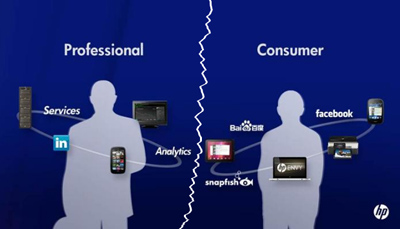HP's Apotheke dissects TouchPad disaster

HP CEO Leo Apotheker hasn't been shy about outlining the company's challenges. He noted that the "tablet effect is real", and has dinged HP's PC business. In addition, the TouchPad failure was about to become a money pit.

(Credit: HP)
That reality led HP to move forward on plans to discontinue webOS devices and plan a spin-off of the PC business. A spin-off and evaluation of options for the PC unit will take 12 to 18 months.
On a conference call with analysts, Apotheker laid out HP's rationale for a radical transformation effort that included the end of the TouchPad, a US$10 billion purchase of Autonomy and PC business spin-off. He said:
Consumers are changing the use of their PC. The tablet effect is real and sales of the TouchPad are not meeting our expectations ... The velocity of change in the personal device marketplace continues to increase as the competitive landscape is growing increasingly more complex, especially around the personal computing arena. There's a clear secular movement in the consumer PC space. The impact of the economy has impacted consumer sales, and the tablet effect is real and our TouchPads has not been gaining enough traction in the marketplace. For our PC business to remain the world's largest personal computing business it needs the flexibility and agility to make decisions best for its user direction.
As for webOS, Apotheker said that the effort was solid, but the traction just wasn't there. He added:
We were successful at launching software that was poised for a different user experience. We know that many developers feel the operating system is elegantly designed and is a respected platform. Therefore, we are exploring options for how best to optimise the value of webOS software going forward. However, our webOS devices has not gained enough traction in the marketplace with consumers, and we see too long of ramp up in the market share. Due to market dynamics significant competition and a rapidly changing environment, and this week's news only reiterates the speed and nature of this change; continuing to execute our current device approach in this marketplace is no longer in the best interest of HP and HP shareholders.
CFO Cathy Lesjak indicated how bleak the TouchPad battle has become:
Our intention was to solidify webOS as the clear number two platform for tablets, but with such a young ecosystem, and poorly received hardware, we were unable to achieve our target. Additionally, it quickly became clear that pricing parity would not generate demand, and we subsequently lowered TouchPad pricing by US$100, which has added incremental near remember it costs to our model. Even with the price reduction in the third quarter, we needed to better align our unit forecast with the sell-through reality in quarter, and we took a US$0.05 charge to [earnings per share] in addition to the loss we were already expecting in the business. We would expect an even larger loss for webOS in the fourth quarter if we continue to operate the business in its current form. Essentially, the TouchPad and our webOS phones have not met our financial targets and other milestones that were set. To make this investment a financial success would require significant investments over the next one to two years, creating risks without clear returns. Therefore, we have decided to shut down operations around webOS devices, and will be exploring strategic alternatives.
In the end, keeping up with the PC business and trying to compete with the TouchPad became a dangerous distraction, as HP tried to retool its enterprise services business. HP is also under fire from Oracle for critical systems. In other words, HP couldn't allow a tablet foray to kill its cash cows. Apotheker said:
There are practical issues that we are facing. The challenge to our business-critical systems business due to the Oracle is real, and we are addressing that and we are confronting the challenge of the Japanese earthquake in our printing business, and still face the yen headwind, and fourth, we must create more strategic relationships with our customers that will come from the delivering value-added IP.
Via ZDNet US